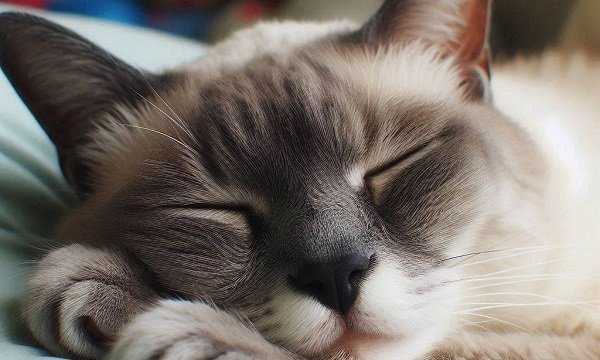Siamese cats are known for their striking blue eyes, sleek bodies, and talkative nature. These intelligent and affectionate felines make wonderful companions, but they also require specific care to thrive. Whether you’re a new Siamese cat owner or looking to improve your furry friend’s quality of life, this guide will walk you through everything you need to know about caring for your Siamese cat.

Table of Contents
Understanding Siamese Cat Temperament
Before diving into the nitty-gritty of Siamese cat care, it’s crucial to understand their unique temperament. This knowledge will help you provide the best care possible.
Personality Traits
Siamese cats are known for their:
- Intelligence
- Curiosity
- Playfulness
- Affectionate nature
- Vocal tendencies
Social Needs
Siamese cats are highly social creatures. They:
- Crave human interaction
- Often form strong bonds with their owners
- May become lonely or depressed if left alone for long periods
Intelligence and Training Potential
Due to their high intelligence, Siamese cats:
- Can learn tricks and commands
- Enjoy puzzle toys and games
- May get into mischief if not properly stimulated
Siamese Cat Nutrition
Proper nutrition is fundamental to your Siamese cat’s health and longevity.
Dietary Requirements
Siamese cats need:
- High-quality protein (meat should be the first ingredient)
- Moderate fat content
- Limited carbohydrates
- Essential vitamins and minerals
Feeding Schedule
- Adult Siamese cats typically do well with two meals a day
- Kittens may require 3-4 smaller meals
- Always provide fresh water
Choosing the Right Cat Food
When selecting food for your Siamese cat:
- Look for foods specifically formulated for cats
- Consider your cat’s age and activity level
- Consult with your vet about wet vs. dry food options
Hydration Importance
Siamese cats, like all cats, need access to fresh water at all times. Consider a cat water fountain to encourage drinking, as many cats prefer moving water.
Grooming Your Siamese Cat
Siamese cats have short, fine coats that are relatively low-maintenance, but regular grooming is still important.
Coat Care and Brushing Techniques
- Brush your Siamese cat once or twice a week
- Use a soft-bristled brush or rubber grooming mitt
- Pay extra attention during shedding seasons
Bathing Frequency and Methods
- Siamese cats typically don’t need frequent baths
- If necessary, use a cat-specific shampoo and warm water
- Always rinse thoroughly and dry your cat completely
Nail Trimming
- Trim your cat’s nails every 2-3 weeks
- Use cat-specific nail clippers
- Be careful not to cut the quick (the pink part of the nail)
Dental Hygiene
- Brush your cat’s teeth regularly with cat-specific toothpaste
- Provide dental treats or toys to help reduce plaque buildup
Exercise and Mental Stimulation
Siamese cats are active and intelligent, requiring both physical exercise and mental stimulation.
Playtime Requirements
- Aim for at least 15-20 minutes of active play twice daily
- Use interactive toys like wand toys or laser pointers
Interactive Toys
Provide a variety of toys, such as:
- Puzzle feeders
- Crinkly balls
- Catnip toys
- Electronic motion toys
Creating an Enriching Environment
- Set up cat trees or shelves for climbing
- Provide scratching posts
- Create hiding spots and cozy nooks
Leash Training Possibilities
Some Siamese cats can be trained to walk on a leash, providing additional exercise and stimulation.
Health Care for Siamese Cats
Regular health care is crucial for maintaining your Siamese cat’s well-being.
Common Health Issues
Siamese cats may be prone to:
- Respiratory issues
- Dental problems
- Eye conditions
- Heart disease
Vaccination Schedule
Follow your vet’s recommended vaccination schedule, which typically includes:
- Core vaccines (rabies, feline distemper, feline herpesvirus, calicivirus)
- Non-core vaccines based on lifestyle and risk factors
Regular Vet Check-ups
- Schedule annual check-ups for adult cats
- Bring your cat to the vet immediately if you notice any concerning symptoms
Parasite Prevention
- Use vet-recommended flea and tick prevention
- Follow a regular deworming schedule
Creating a Siamese-Friendly Home
Your home environment plays a significant role in your Siamese cat’s happiness and well-being.
Litter Box Setup and Maintenance
- Provide one litter box per cat, plus one extra
- Clean the litter box daily
- Choose a quiet, accessible location for the litter box
Scratching Posts and Cat Trees
- Offer a variety of scratching surfaces (vertical, horizontal, different materials)
- Place cat trees near windows for bird-watching opportunities
Safe Spaces and Hiding Spots
- Create cozy nooks for your cat to retreat to
- Ensure high perches for observing their territory
Temperature Considerations
- Siamese cats are sensitive to cold
- Provide warm blankets or heated cat beds in cooler months
Socialization and Companionship
Siamese cats thrive on social interaction and companionship.
Interaction with Family Members
- Spend quality time with your cat daily
- Include your cat in family activities when possible
Introducing Other Pets
- Introduce new pets slowly and carefully
- Supervise interactions until you’re sure all pets get along
Dealing with Separation Anxiety
- Provide engaging toys and puzzles for when you’re away
- Consider getting a second cat for companionship
Consideration for Multiple Siamese Cats
- Siamese cats often do well in pairs
- Ensure each cat has its own resources (food bowls, litter boxes, etc.)
Special Considerations for Siamese Cats
Siamese cats have some unique traits that require special attention.
Vocal Nature and Communication
- Siamese cats are known for being talkative
- Learn to understand your cat’s different vocalizations
Sensitivity to Environment Changes
- Introduce changes to your home gradually
- Provide extra comfort during times of change
Attention-Seeking Behaviors
- Be prepared for a cat that demands attention
- Set boundaries while still providing plenty of love and interaction
Longevity and Senior Care
- Siamese cats often live 15-20 years
- Adjust care as your cat ages, including more frequent vet check-ups
Troubleshooting Common Siamese Cat Issues
Even with the best care, you may encounter some challenges with your Siamese cat.
Excessive Meowing
- Rule out medical issues
- Ensure all needs (food, water, attention) are met
- Don’t reinforce excessive meowing by giving in to demands
Pica (Eating Non-Food Items)
- Keep dangerous items out of reach
- Provide plenty of mental stimulation
- Consult your vet if the behavior persists
Overgrooming
- Check for fleas or skin irritations
- Address potential stress factors
- Consult your vet if you notice bald patches
Separation Anxiety Management
- Gradually accustom your cat to your absence
- Provide engaging toys and comfortable resting spots
- Consider calming aids recommended by your vet

Conclusion
Caring for a Siamese cat requires dedication, but the rewards are immeasurable. These intelligent, affectionate cats make wonderful companions when their unique needs are met. By providing proper nutrition, regular grooming, plenty of exercise and mental stimulation, and lots of love and attention, you can ensure your Siamese cat lives a long, happy, and healthy life.
Remember, every cat is an individual. While this guide provides general advice for Siamese cat care, always consult with your veterinarian for personalized recommendations based on your cat’s specific needs.
For more information on cat care, check out these helpful resources:
Siamese Cats Care FAQ’s
How often should I feed my Siamese cat?
Adult Siamese cats typically do well with two meals a day. Kittens may require 3-4 smaller meals. Always provide fresh water and consult with your vet for personalized feeding recommendations.
Are Siamese cats good with children?
Siamese cats are generally good with children, especially when raised together. They’re playful and affectionate, but it’s important to teach children how to interact gently and respectfully with cats.
How can I keep my Siamese cat entertained when I’m not home?
Provide interactive toys, puzzle feeders, and climbing structures. Some cats enjoy watching bird videos or having a cat tree near a window. Consider getting a second cat for companionship if you’re often away.
Do Siamese cats shed a lot?
Siamese cats have short, fine coats and generally shed less than many other breeds. However, they do still shed, especially during seasonal changes. Regular brushing can help manage shedding.
How can I stop my Siamese cat from meowing excessively?
First, rule out medical issues with a vet check. Ensure all basic needs are met. Don’t reinforce the behavior by giving in to demands. Provide plenty of mental stimulation and interactive play to keep your cat engaged and content.


